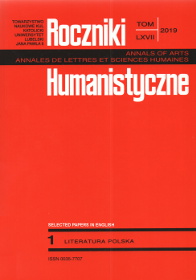Herbert’s Postcolonial Antiquity and Defensive Nationalism
Herbert’s Postcolonial Antiquity and Defensive Nationalism
Author(s): Dirk UffelmannSubject(s): Language and Literature Studies, Studies of Literature, Polish Literature
Published by: Towarzystwo Naukowe KUL & Katolicki Uniwersytet Lubelski Jana Pawła II
Keywords: Zbigniew Herbert; poetry; antiquity; Polish People’s Republic; postcolonialism; nationalism; internal colonization
Summary/Abstract: The Polish version of this article was published in Roczniki Humanistyczne vol. 65, issue 1 (2017).This paper proposes a postcolonial reading of antiquity motifs from Zbigniew Herbert’s po-ems from the times of socialism. References to ancient history, mythology, and biblical allusions are interpreted as allegories of the political culture in the Polish People’s Republic. While in his poems written between 1956 and 1990 Herbert depicts communism as an attempt at Russian colonization of Poland, in seminal texts the focus lies mainly on the internal effects for the Polish colonized mind. Linking communist Moscow to ancient Rome, Herbert accomplishes a peculiar anti-imperial translatio imperii. It is this trans-chronic perspective of Herbert’s poems which allows for rounding off the paper with connecting Herbert’s anti-imperial attitude with defensive nationalism and proposing recent right-wing tendencies in the Polish appropriation of post-colonial theory (Ewa Thompson et al.) as a heuristic model for understanding Herbert’s civil position during communism.
Journal: Roczniki Humanistyczne
- Issue Year: 67/2019
- Issue No: 1SP
- Page Range: 21-42
- Page Count: 22
- Language: English

